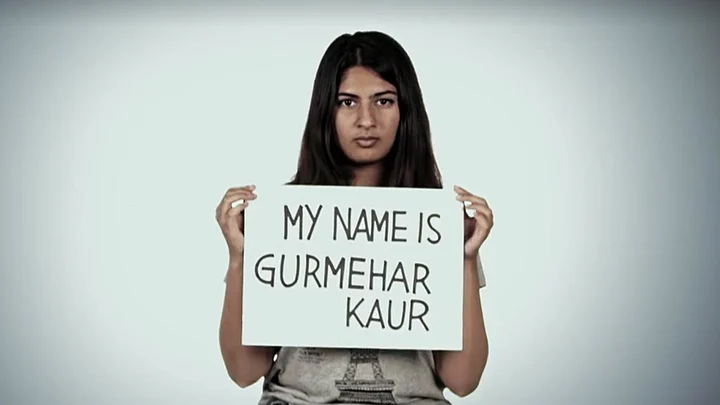She is all of 20. But when you meet her for the first time, her calm and composed nature may trick you into thinking otherwise.
Gurmehar Kaur has tread the slippery path between the imagined nation-state and the loyalty expected towards it. In February 2017, Kaur was targeted by trolls after she launched a campaign to protest the violence allegedly perpetrated by ABVP supporters outside Ramjas College. What followed was an overwhelming barrage of unsolicited advice, criticism and profanities from trolls. Some even dug up a few of her old videos in their bid to attack her.
Gurmehar was warned that she had no choice but to fit into a tailored box, full of “patriotic" tools.
In a conversation with The Quint on Wednesday, Gurmehar discussed life after her campaign. She also spoke about her upcoming book. All was well until the comments began pouring in on The Quint’s Facebook Live. As Gurmehar spoke about her book and her favourite authors, she was bombarded with a number of hateful comments.
The Fear is Real
She didn’t utter a single hateful word. Yet, she found herself at the receiving end of endless profanities wrapped in filthy speech. Perhaps more so because she is a woman. After all, her ‘honour’ can be traced down to her nether regions, no matter what she does.
If Gurmehar Kaur’s trolls represent what is actually out there waiting for everyone who dares to speak their mind, then I fear for our future because the hostility runs deeper than the written word. It unflinchingly points to a growing intolerance and a complete dismissal of different ideas.
It is something we all should be worried about. People may disagree with what you have to say, but no one, I repeat, no one, has the right to NOT let you say it.
Acclaimed scholar Benedict Anderson, in his book titled, ‘Imagined Communities: Reflections on the Origin and Spread of Nationalism’, had theorised that imagined communities (the idea of the ‘nation-state’ in this case) came into being because of 'print capitalism'. When books were printed in vernacular languages in order to boost circulation, readers connected over the language, leading to the evolution of a common discourse. Thus, the first European nation-states were formed around their ''national print-languages''.
Today, a new wave of ‘capitalism’ seems to be tethering people to an online community that makes it easy for anyone to lash out at any time. The irony lies in the knowledge that these members are, once again, connecting over a 'language' – one that unleashes terror and hate at the drop of a hat.
(At The Quint, we question everything. Play an active role in shaping our journalism by becoming a member today.)
